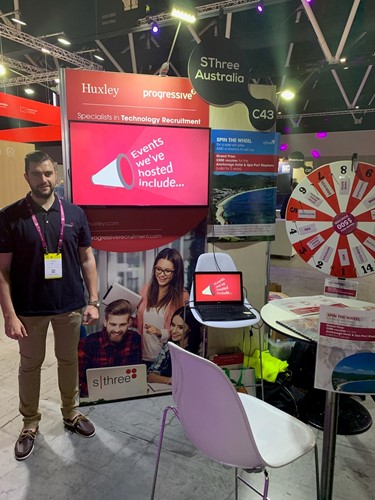Huxley partnered with major technology event CEBIT

The team here at Huxley were lucky enough to partner with CEBIT Australia by exhibiting all three days towards the end of October at the ICC in Darling Harbour. Following on from the success of last year’s event, this year’s CEBIT again played host to a variety of speakers on various topics within the industry, such as Transformation & Disruption and Data Privacy & Trust.
While CEBIT is relevant for a variety of industries, we definitely found it beneficial from a recruitment point of view.
 At our booth, we were able to interact with clients and candidates who are currently working with us or may be interested in finding out more about the talent landscape in Australia. This was a great opportunity for us to share more about the industry from a recruitment standpoint and were really glad that many who dropped by benefitted from it.
At our booth, we were able to interact with clients and candidates who are currently working with us or may be interested in finding out more about the talent landscape in Australia. This was a great opportunity for us to share more about the industry from a recruitment standpoint and were really glad that many who dropped by benefitted from it.
Who stood out at the event?
One really interesting company we met which we feel deserve a shout out is Triggr , a company which focus on empowering sales professionals with intelligence data and real time web alerts aimed at lead generation. Their service offering is one which we feel is really innovative within the market and definitely is a niche for.
We found Cameron Kahler, Head of Sales for FlareHR, particularly insightful as he delved deep into the theme of Transformation and Disruption. This discussion on HR Tech served well in demonstrating exactly how HR technology will drive technology investments in 2020. We left this talk with a better understanding of new technology which will impact recruitment.
Another speaker we would like to mention is Steve Nouri, Head of Data Science for CSIRO's Data61 Ribit, an online matchmaking platform that directly connects students with companies, startups and SME’s which could in turn be prospective employers. This session really enlightened us on how data science is changing the way which businesses work. As businesses invest more and more in data science, we felt this was a really relevant and enlightening topic for us and that Steve spoke really well about it. A lot of learnings to be had here.
Last but not least, Eric Wilson, CEO & Founder of Australian neobank Xinja, delivered a fireside chat again under the general theme of transformation and disruption but with particular emphasis on the world of neobanking. This relatively new concept which is 100% digital looks set to take the payments world by storm in time to come. Overall, the talk was such a great learning experience for us.
Some of our key learnings from this year’s CEBIT was mainly focused on exactly how the architecture is changing within the technological recruitment space and how understanding this new tech can impact our recruitment process. This year’s CEBIT was a really worthwhile experience and we’re looking forward to next year’s event already. If you did not attend CEBIT this year but would like to find out more about the recruitment landscape for tech, please feel free to reach out to Australia@huxley.com or follow us on our LinkedIn page for recruitment related updates.
See you next year!
Huxley is part of the larger SThree group



